

National Ocean Economics Program.
Glogin?URI= Protected areas. Protected Areas urged to better identify economic value they bring – 17 Dec 2015 – BusinessGreen print view. Protected Areas (PAs), such as National Parks and World Heritage Sites, are "increasingly vulnerable" to mounting financial and environmental pressures, according to a new report that argues they need to better articulate the economic value they bring in order to attract new investment.
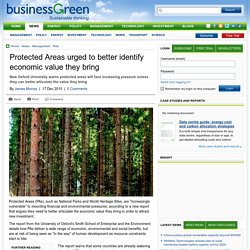
The report from the University of Oxford's Smith School of Enterprise and the Environment details how PAs deliver a wide range of economic, environmental and social benefits, but are at risk of being seen as "in the way" of human development as resource constraints start to bite. The report warns that some countries are already watering down their PA commitments through protected area downgrading, downsizing, and degazettement (PADDD), while PA budgets have been cut in a number of jurisdictions around the world. "For protected areas to succeed they need to attract new public, philanthropic, and private investment," he said in a statement.
GRID-Arendal on the move: World Ocean Assessment – Group of Experts meeting. The United Nations General Assembly (UNGA) decided in 2006 that it would commission a World Ocean Assessment (WOA), which would investigate what is known about the environmental condition of our oceans and coasts, including social and economic aspects of marine-based industries.
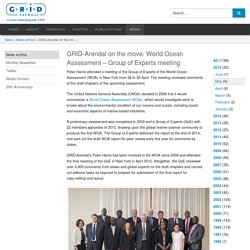
A preliminary assessment was completed in 2009 and a Group of Experts (GoE) with 22 members appointed in 2010, drawing upon the global marine science community to produce the first WOA. The Group of Experts delivered the report at the end of 2014, and sent out the draft WOA report for peer review early this year for comments by states. Roberts and Company Publishers Field Guide to Economics for Conservationists, A - Ricketts, Taylor (University of Vermont) - Authors. About this Guide Why do conservationists need a field guide to economics on their shelves alongside the well-loved bird and plant guides?
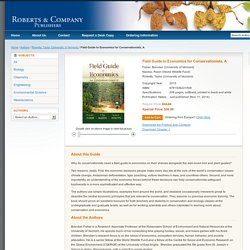
Two reasons, really. First, the economic decisions people make every day are at the core of the world’s conservation issues: climate change, Amazonian deforestation, tiger poaching, vulture declines in Asia, and countless others. Second, and more importantly, an understanding of the economic forces behind these decisions can help conservationists safeguard biodiversity in a more sophisticated and effective way. The authors use simple illustrations, examples from around the world, and readable (occasionally irreverent) prose to describe the central economic principles that are relevant to conservation.
Wolfs Company. Biodiversity & ecosystem services. Health & Ecosystems: Analysis of Linkages. Natural Capital Project/ InVEST. TEEB related. Holistic Integration for Arctic Coastal-Marine Sustainability. Inventory and development of monitoring programme for nature values in Estonian marine areas (NEMA) Institute for European Environmental Policy - Financing Biodiversity. Following in the footsteps of the global The Economic of Ecosystems and Biodiversity (TEEB) initiative, the Nordic Council of Ministers (NCM) and the NCM Finnish Presidency decided in 2011 to initiate a TEEB inspired synthesis in the Nordic context (TEEB Nordic).
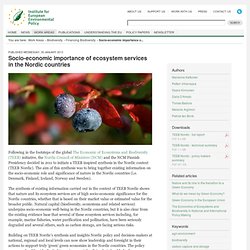
The aim of this synthesis was to bring together existing information on the socio-economic role and significance of nature in the Nordic countries (i.e. Denmark, Finland, Iceland, Norway and Sweden). The synthesis of existing information carried out in the context of TEEB Nordic shows that nature and its ecosystem services are of high socio-economic significance for the Nordic countries, whether that is based on their market value or estimated value for the broader public. Norge valgt inn i styret for Naturpanelet. Ivar A.
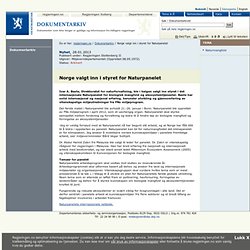
Første professor i øko-økonomi: Vi kommer med et uønsket budskab. Det er en ældgammel idé.
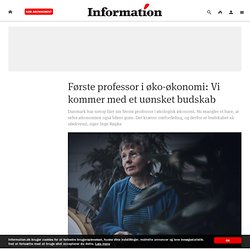
Det startede egentlig med fysiokraterne,« siger Inge Røpke. Og nu har ideens udbredelse nået et foreløbigt lokalt højdepunkt med udnævnelsen af Danmarks første professor i økologisk økonomi. Fysiokraterne var de franske naturfilosoffer, som i 1700-tallet mente, at naturlovenes gyldighed også måtte omfatte menneskesamfundene. Og Danmarks første økologiske økonomiprofessor er Inge Røpke. Udnævnt af Aalborg Universitet og tilknyttet universitetets nye Center for Design, Innovation og Bæredygtig Omstilling, DIST, der har til huse i Københavns sydvestkvarter og som officielt indvies den 11. januar. Ecosystems Services for Poverty Alleviation (ESPA) (This blog originally appeared on Wetlandia, and appears here with permission of the author) A report just out from Resource Media on public communications strategies and "messaging" for ecosystem service policies leans heavily on the fascinating 2010 national opinion survey on "ecosystem services".
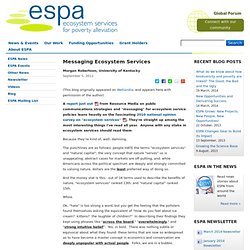
They're straight up among the most interesting things I've read all year. Anyone with any stake in ecosystem services should read them. Voters in Iceland back new constitution, more resource control. Scientists say billions required to meet conservation targets. Global biodiversity priced at $76 billion. Thinkstock The cash needed to conserve the world's species is a small price for biodiversity's “goods and services”, researchers say.
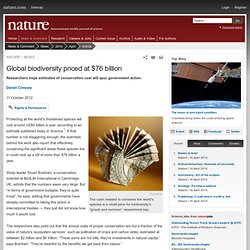
Protecting all the world's threatened species will cost around US$4 billion a year, according to an estimate published today in Science1. If that number is not staggering enough, the scientists behind the work also report that effectively conserving the significant areas these species live in could rack up a bill of more than $76 billion a year. Study leader Stuart Butchart, a conservation scientist at BirdLife International in Cambridge, UK, admits that the numbers seem very large. But “in terms of government budgets, they’re quite trivial”, he says, adding that governments have already committed to taking this action in international treaties — they just did not know how much it would cost. Ecosystem-Services-Seminar-3-Valuation.pdf (application/pdf Object) Ecosystems Knowledge Network - Welcome to the Ecosystems Knowledge Network, a resource for anyone wanting to share knowledge or learn about the practical benefits of an ecosystems approach to both people and nature.
ENG-Chapter-5.pdf (application/pdf Object) Natural Capital. Ecosystem Services. Natural Capital in Rouge National Park. Download PDF | View news release This report provides the first-ever estimate of the economic value of ecosystem services provided by Canada's future Rouge National Park and its surrounding watersheds.
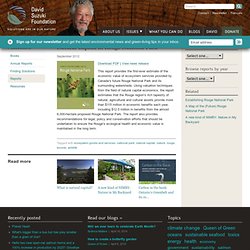
Using valuation techniques from the field of natural capital economics, the report estimates that the Rouge region's rich tapestry of natural, agricultural and cultural assets provide more than $115 million in economic benefits each year, including $12.5 million in benefits from the almost 6,000-hectare proposed Rouge National Park. The report also provides recommendations for legal, policy and conservation efforts that should be undertaken to ensure the Rouge's ecological health and economic value is maintained in the long term.
Economic Impact of Protected Areas in Europe - How Businesses can benefit from the Economic Values of Protected Areas - EUROPARC Federation. In Europe, many different tools are used for protecting biodiversity and natural areas including the Natura 2000 network, the Habitats Directive and the European Charter for Sustainable Tourism in Protected Areas.
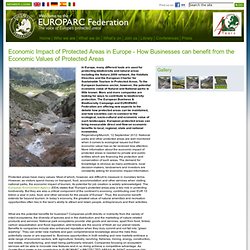
To the European business sector, however, the potential economic value of Natural and National parks is little known. Putting a price on the rivers and rain diminishes us all. 'The first man who, having enclosed a piece of ground, bethought himself of saying 'This is mine', and found people simple enough to believe him, was the real founder of civil society. From how many crimes, wars and murders, from how many horrors and misfortunes might not anyone have saved mankind, by pulling up the stakes, or filling up the ditch, and crying to his fellows, 'Beware of listening to this impostor; you are undone if you once forget that the fruits of the earth belong to us all, and the earth itself to nobody'. " Jean Jacques Rousseau would recognise this moment.
Now it is not the land his impostors are enclosing, but the rest of the natural world. In many countries, especially the United Kingdom, nature is being valued and commodified so that it can be exchanged for cash. Call for Content! SB Issues in Focus: The New Metrics of Sustainable Business. July 30, 2012 — Calling all innovators & implementers! During the month of September 2012, Sustainable Brands will be publishing daily features, interviews, columns and case studies on “The New Metrics of Sustainable Business.” As guest editors of this effort, corporate sustainability architect Bill Baue and Paul Herman and Nick Gower of HIP Investor are seeking content to publish during the month. This is a great opportunity to showcase the innovations you and your organization have pioneered – sustainable business metrics that strategically link to financial, ecological and social performance.
Content Guidelines: World Business Council for Sustainable Development. Companies use ecosystem services, and that use alters the ecosystems and their ability to provide services. This publication discusses the challenges inherent in the use of ecosystem services and the implications for business. Ecosystem Challenges and Business Implications warns that companies must transform business models and operations if they are to avoid major economic losses caused by the current degradation of ecosystems and the vital services they provide. Produced by Earthwatch Institute (Europe), the World Conservation Union (IUCN), the World Business Council for Sustainable Development (WBCSD), and the World Resources Institute (WRI), this publication is based on global scientific facts and projections from the UN's multi-year Millennium Ecosystem Assessment and interviews with a range of business leaders to assess the implications and strategies needed to respond to environmental challenges.
This is the first of three publications to be produced by the four partners. Portland, Oregon, United States. Overcoming hunger and meeting the nutritional needs of almost 07 billion people, rising to over 09 billion people by 2050, is a central challenge for this generation (Steiner, 2011). Since the hunger riots in 2008, agriculture and food issues have dramatically return to the forefront of global political agenda as one of the major concerns of 21st Century (Patrick, 2011). Thus ensuring food security will be an important issue for policy makers to support the management of agro-ecosystem services by taking suitable measures for sustainable management of multifunctional agro-ecosystems. Typical agricultural ecosystems besides providing marketed services like food, forage, bio-energy and pharmaceuticals, also provide other non marketed ecosystem services such as watershed protection, crop pollination, carbon sequestration, landscape beauty and many other services, but such services have been overshadowed by food production and they are never valued and entered in our accounting calculus.
The Little Biodiversity Finance Book - 3rd edition (2012) The third edition of the Little Biodiversity Finance Book is the new, revised guide to proactive investment in natural capital (PINC) and an introduction to financing options for biodiversity and ecosystems services. It is being released on 5 June 2012 - World Environment Day. The aim of the book is to help key stakeholders including governments, NGOs, the private sector, indigenous peoples and local communities to compare existing and future options for biodiversity and ecosystem finance in a clear and consistent way. Based on the latest available information, the 2012 edition of the book identifies sources of finance that can be harnessed to raise up to USD 159 billion by 2020 to help meet the target of halting global biodiversity loss. Competitiveness 2.0. By Mathis Wackernagel, President, Global Footprint Network and André Schneider, Chairman and CEO, Global Advisory SA What is at Stake?
We are entering a new era, one in which resource costs are rapidly becoming an ever more significant economic factor. Today, resource demand is so high that biocapacity — the services and resources that nature makes available — is being overexploited, not just locally but at the planetary scale. If these trends continue, resource constraints will become a leading factor determining economic success — or crisis — in the 21st century. Course corrections are still possible. Recognizing these new dynamics offers opportunities. Decision-makers must better recognize all the key economic drivers of success. Free exchange: The real wealth of nations. NEW! Follow-on Phase. World Bank Pushes for 'Green Accounting' by Nations.
Risks and rewards of quantifying nature's 'ecosystem services' Accounting for pollution likely within a decade - group. Wild Wealth, a new documentary of biodiversity. In a joint collaboration, National Geographic and the IDB produce a film on five regions Share the video - Sign up to watch the sneak preview on June 20 Follow us in #BioBID.
Nature's services: societal dependence on natural ecosystems - Gretchen C. Daily. The Work of Nature: How the Diversity of Life Sustains Us - Yvonne Baskin. Millennium Ecosystem Assessment. Sub-Global Assessment Network - Sub-Global Assessment Network. Kompetenzzentrum "Naturkapital Deutschland" (KNK) Im Mai 2011 wurde im Bundesamt für Naturschutz (BfN) das Kompetenzzentrum „Naturkapital Deutschland“ gegründet. Anliegen des Kompetenzzentrums ist die Weiterentwicklung einer Erfassung und Bewertung der Leistungen von Ökosystemen und Biodiversität für Wirtschaft und Gesellschaft. Ein wesentliches Element ist dabei die fachliche Betreuung der Studie „ Naturkapital Deutschland“ als nationale Umsetzung der abgeschlossenen internationalen „TEEB“-Studie zur Ökonomie von Ökosystemen und Biodiversität.
Das KNK hat hierbei im Einzelnen folgende Aufgaben: Ecosystems and Human Well-Being: A Manual for Assessment Practitioners - Neville Ash, Hernan Blanco, Keisha Garcia. Living With Environmental Change and the National Ecosystem Assessment. UK NEA. Environment - WAVES Home page. Ekspertutvalget om verdier av økosystemtjenester. Økosystemtjenester er goder og tjenester som vi får fra naturen og som bidrar til menneskelig velferd. Da FN la frem sin økosystemstudie i 2005 konkluderte studien med at menneskelig aktivitet har en klar og økende negativ effekt på klodens biologiske mangfold og økosystemer. Den viste også at både motstandskraften og kapasiteten i økosystemene er redusert. Regjeringen Stoltenberg II etablerte 28. oktober 2011 et norsk ekspertutvalg om verdier av slike økosystemtjenester. Ekspertutvalget skulle arbeide med verdier av økosystemtjenester, beskrive konsekvenser for samfunnet av at disse tjenestene forringes, peke på hvordan relevant kunnskap kan formidles til beslutningstakere og gi anbefalinger om hvordan hensynet til økosystemtjenester kan bli bedre ivaretatt i private og offentlige beslutninger i Norge.
Direktoratet for naturforvaltning - Verdien av naturmangfold og økosystemtjenester. Naturen gjør mange tjenester for oss, som å produsere mat, fiber og brensel. Direktoratet for naturforvaltning - Internasjonalt arbeid med TEEB. 18.11.2011 | Endret 15.05.2013. Naturmangfoldåret 2010 - Å gjøre naturverdier synlige økonomisk. Pavan Sukhdev. GIST Advisory Pvt. Ltd/index. TEEB 2012 Conference in Leipzig « Cow Burps – A UK-based environmental economics blog. I recently attended the TEEB 2012 conference in Leipzig titled: Mainstreaming the Economics of Nature: Challenges for Science and Implementation.
The TEEBelgium D0 conference: welcome. Global Partnership for Oceans. Valuing the Ocean: Preview Summary. SEI-Preview-ValuingTheOcean-DraftExecutiveSummary.pdf (application/pdf Object) National Ocean Economics Program. Intergovernmental Science-Policy Platform on Biodiversity and Ecosystem Services (IPBES) - Intergovernmental Science-Policy Platform on Biodiversity and Ecosystem Services (IPBES) World governments establish biodiversity panel. Governments from more than 90 countries have agreed to establish an independent panel of scientists to assess the very latest research on the state of the planet's fragile ecosystems. We need an international approach to biodiversity (but local action)
Natural capital. What is natural capital? Environmental economics. World Bank Pushes for 'Green Accounting' by Nations. Securing Canada’s Natural Capital: A Vision for Nature Conservation in the 21st Century. Canada News: What’s a polar bear worth to you? Ecosystem services. The case for an ecosystem service approach to decision-making: an overview. Ecosystem Services - living within environmental limits.